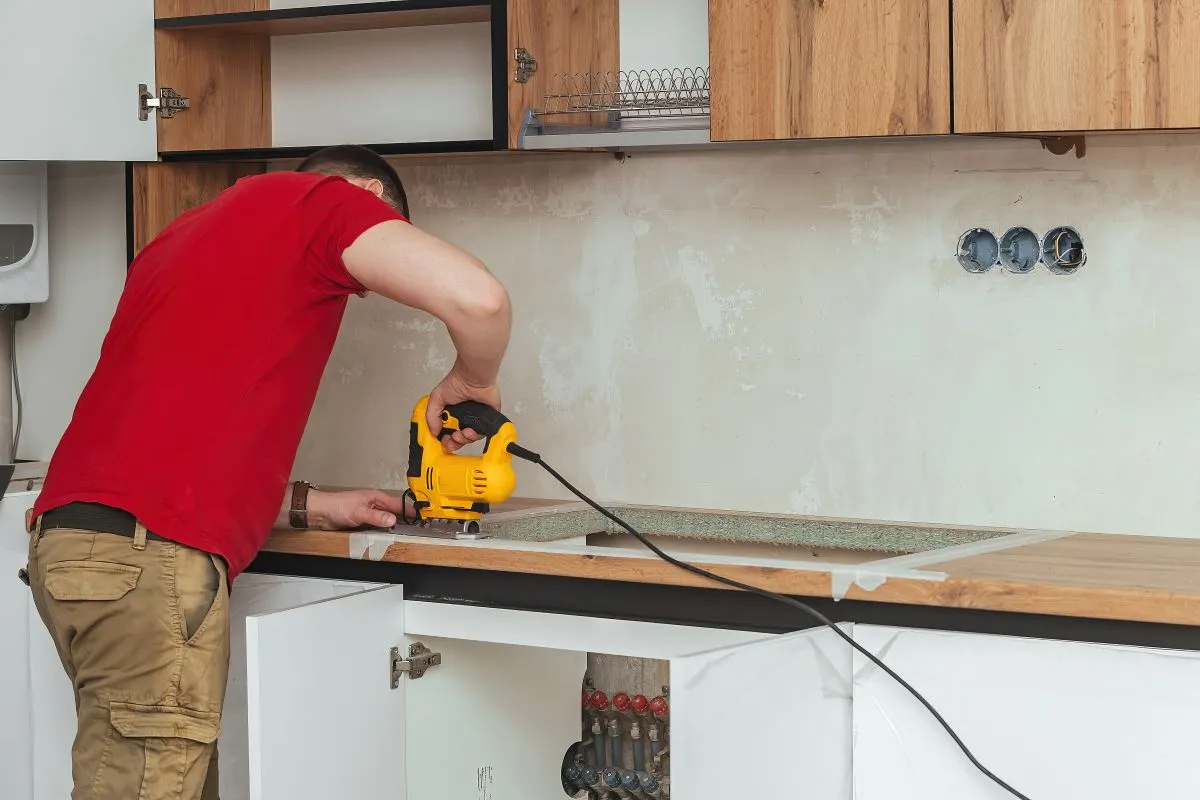July 15, 2025

Your countertops are damaged, dated, or just don't spark joy anymore. You know something needs to change, but should you repair the existing surface or resurface completely? The wrong choice could cost you thousands of unnecessary dollars or leave you with results that don't last.
After 17 years of restoring Utah countertops, I've helped homeowners navigate this exact decision hundreds of times. The choice between countertop repair and resurfacing depends on factors most people never consider.
Let me break down everything you need to know to make the right choice for your situation and budget.
Countertop repair fixes specific damage while preserving your existing surface. Think of it as targeted surgery rather than a complete makeover.
Common repairs include:
The goal is making damage invisible while maintaining your countertop's original appearance and functionality.
Countertop resurfacing completely changes your surface appearance and texture. This process applies new material over your existing countertop base, essentially giving you a brand new look without full replacement.
Resurfacing options include:
Resurfacing transforms your countertops' entire appearance while using the existing substrate.
If damage affects less than 30% of your countertop surface, repair makes financial sense. Why resurface an entire kitchen when only the sink area needs attention?
Perfect for repair:
Premium materials like granite, quartz, or marble justify repair investment. These surfaces, when properly maintained, can last decades with periodic repairs.
Countertop repair costs 80-90% less than resurfacing or replacement. A $200 chip repair beats a $2,000 resurfacing project every time.
Most repairs complete within hours, not days. If you need your kitchen functional immediately, repair provides the fastest solution.
When your countertops perfectly match your kitchen design, repair maintains that harmony without forcing style changes.
If damage covers more than 30% of your countertops, resurfacing becomes more cost-effective than multiple repairs.
Resurfacing indicators:
Want to completely change your kitchen's look? Resurfacing offers dramatic transformation options that repair cannot provide.
Some problems require complete surface renewal:
If you plan to stay in your home for 10+ years, resurfacing provides better long-term value than repeated repairs.
Repair works best for:
Resurfacing makes sense when:
Granite's natural beauty and durability usually favor repair over resurfacing unless damage is extensive.
Quartz countertop repair handles:
Quartz resurfacing considerations: Quartz rarely needs complete resurfacing due to its durability. Most issues respond well to targeted repairs.
Laminate countertop repair fixes:
Laminate resurfacing benefits: Laminate responds excellently to resurfacing treatments. The smooth, non-porous surface accepts new coatings well, making resurfacing often more practical than repair.
If repair costs exceed 40% of resurfacing costs, resurfacing often provides better value.
Professional countertop repairs last 5-15 years depending on:
Quality resurfacing systems last 10-20 years with proper care. However, durability varies significantly between different resurfacing methods.
Most Durable: Concrete overlays, epoxy systems Moderate Durability: Paint-based refinishing
Least Durable: Decorative films, temporary solutions
Repaired areas require the same maintenance as your original countertops. No special care needed beyond normal cleaning and sealing schedules.
Different resurfacing materials have unique maintenance requirements:
Small chips and scratches can be DIY projects using retail repair kits. However, color matching and blending require professional skills for invisible results.
DIY Success Rate: 30-40% achieve acceptable results Professional Success Rate: 95%+ achieve invisible repairs
Resurfacing involves surface preparation, mixing ratios, application techniques, and finishing skills. DIY failures are expensive to correct.
DIY Resurfacing Problems:
Ask yourself these five questions to determine your best choice:
1. How much of my countertop surface has damage?
2. What's my budget for this project?
3. How long do I plan to stay in this home?
4. Do I want to change my kitchen's appearance?
5. What's my timeline for completion?
Sometimes neither repair nor resurfacing makes sense:
Structural Problems:
Extensive Damage:
Economic Factors:
In these situations, full countertop replacement becomes the most practical solution.
Getting professional evaluation costs nothing but provides invaluable insight. Experienced contractors can:
At Cobble Creek Countertops, we provide free assessments that help homeowners make informed decisions. Sometimes we recommend repair when customers expect to need resurfacing. Other times, we suggest resurfacing when customers think repair will work.
Choose Repair When:
Choose Resurfacing When:
Consider Replacement When:
Your countertops are a significant investment in your home's functionality and appearance. Make the choice that provides the best value for your specific situation, timeline, and budget.
Ready to make the right decision for your countertops? Contact Cobble Creek Countertops at (801) 618-7699 for a free assessment. We'll evaluate your situation objectively and recommend the most cost-effective solution for your needs.